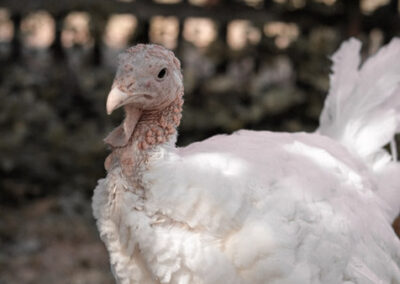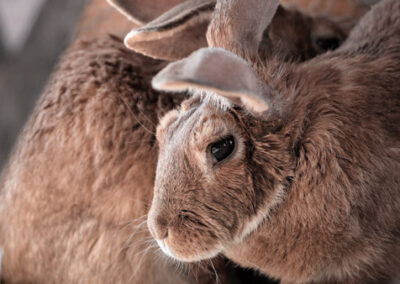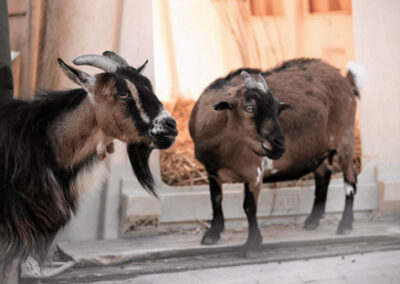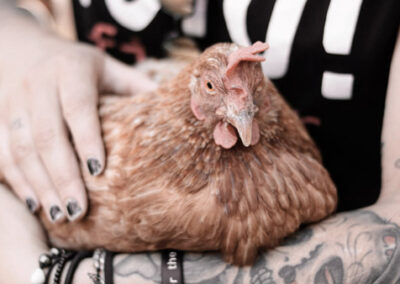Ethics: veganism
Have you ever asked yourself why humans eat some animals and lovingly keep others as pets? Is this behaviour still rational and ethically justifiable today, when the consumption of animal products is no longer necessary for our health and the negative effects on the environment and climate can no longer be denied? How does the consumption of organic meat and vegetarian food differ from the principles of veganism? We will get to the bottom of these questions on this page.
Why do we eat animals?
Out of sight, out of mind
In our society it is considered normal and sometimes even necessary to eat animals. This social norm is hardly ever questioned, because we all grew up with it – it is part of our education and our everyday life. The consumption of animal products is usually only shaken when its effects become visible, e.g. through the investigations of animal rights activists or environmental activists. But after a brief outcry in the (social) media, the horror that animals experience every day is quickly forgotten. How can this be?
Carnism
Carnism is a term developed by the US-American behavioural psychologist Dr. Melanie Joy. It describes an unconscious ideology that enables us to justify the consumption and killing of animals, or to switch off our empathy, through internal defence mechanisms. Typical beliefs are: the animals have a good life, feel no pain when slaughtered and vegan food is more expensive, does not taste good and leads to nutrient deficiency. Meat consumption is seen as normal, natural and necessary at the same time – justifications that have been used by other violent ideologies: from patriarchy to slavery.
The Animal Welfare Act
As a society we have recognised that animals are sentient beings who can feel pain. For this reason, the Animal Welfare Act has been enacted, the aim of which is to minimise the suffering of animals. The resulting Animal Welfare Act describes minimum standards, but these are very low and the maximisation of profits for farmers is considered sufficient reason to lock up pigs, cows and chickens for their entire lives, cut off their tails, pull out their teeth and remove their horns, etc.
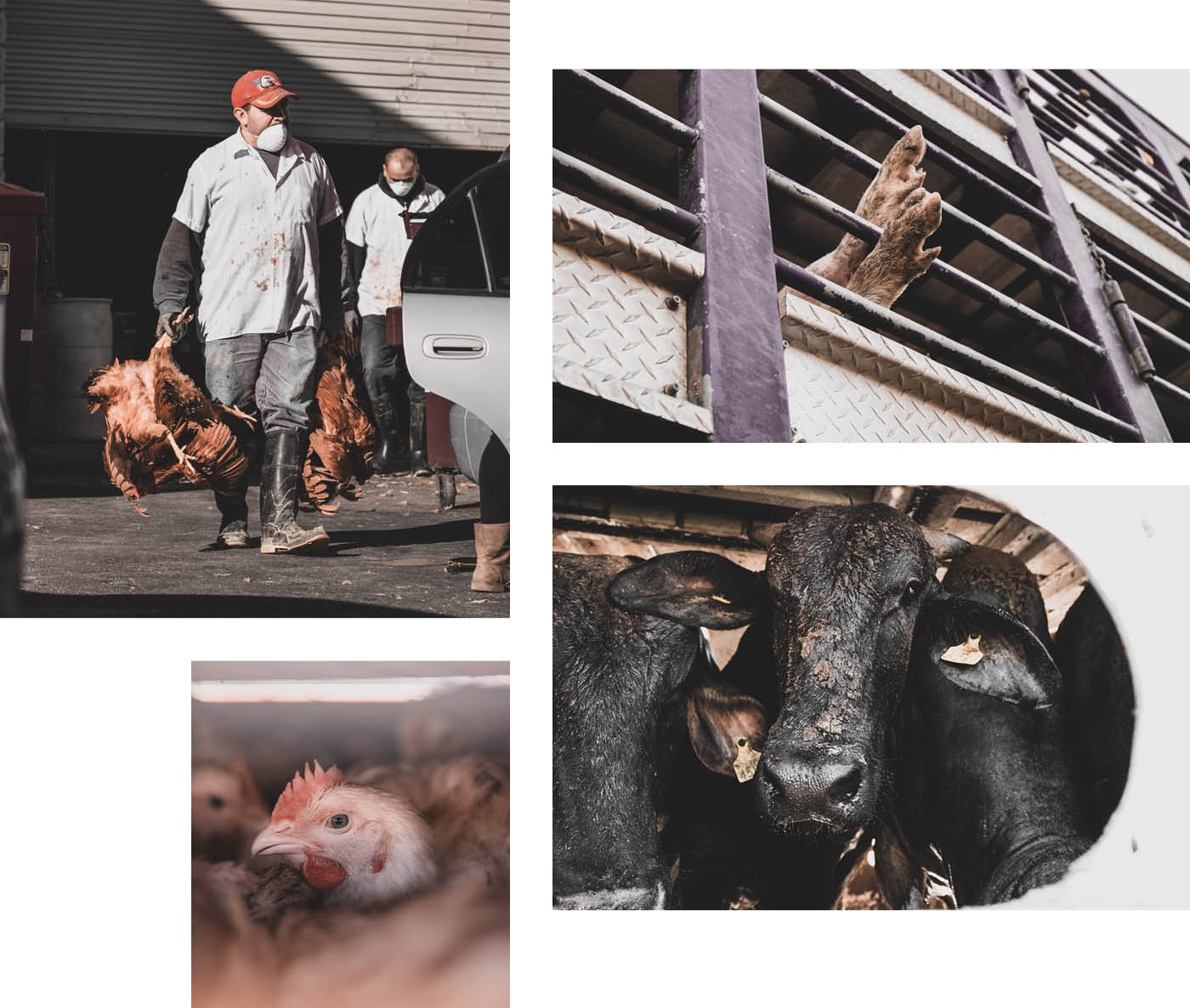
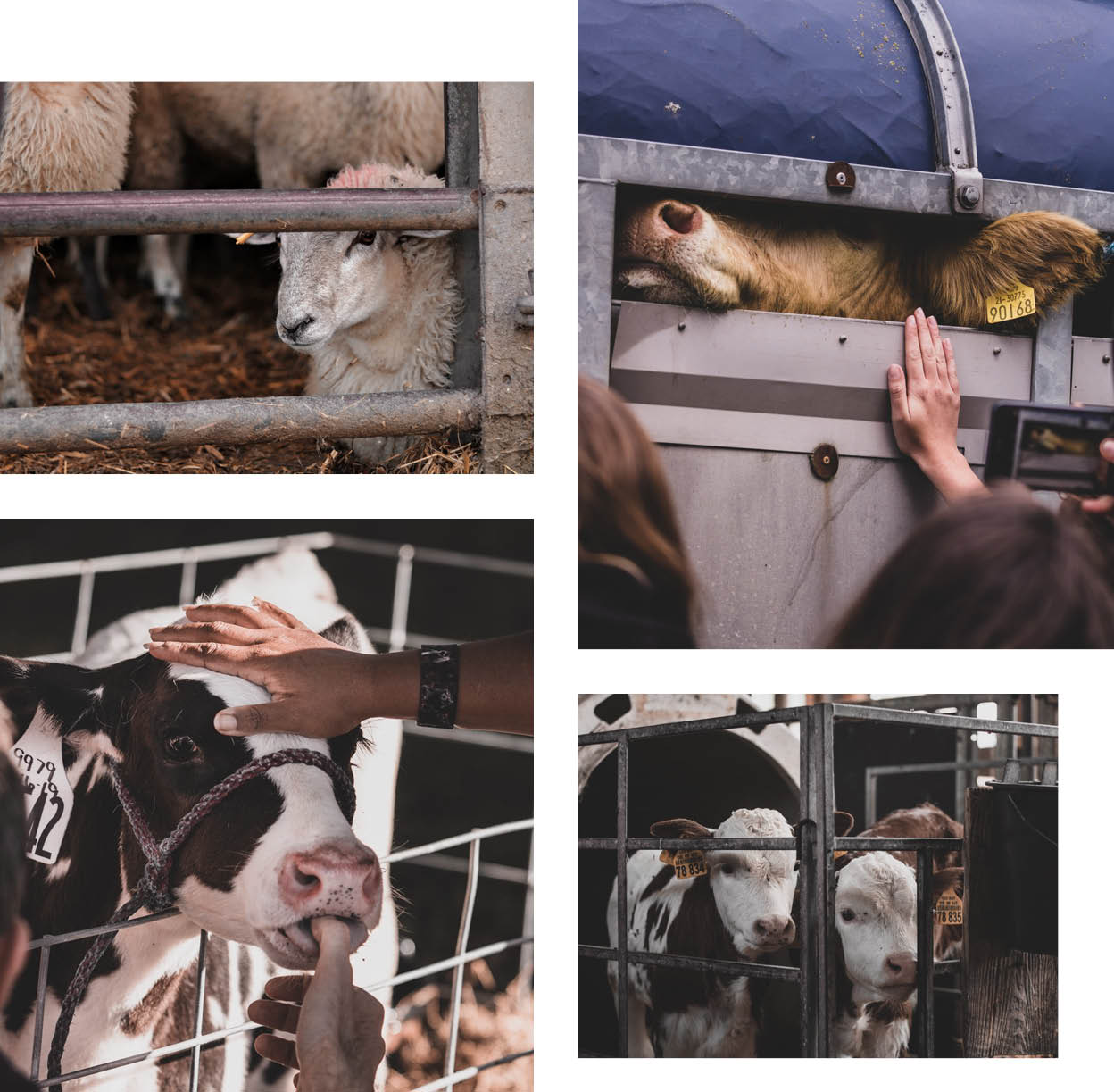
Pets and farm animals
For our pets we would never consider economic targets as justification for their exploitation and killing. Anyone who has a dog or cat at home knows that animals not only feel pain, but also have complex feelings of joy, sadness and fear, that they need more than enough exercise, cleanliness and non-violent treatment to be happy. They need attention, love, entertainment and a social structure like a family where they can feel safe. Whether conventional agriculture, "organic" or "free-range" – you cannot do justice to intelligent, sentient living beings if you regard them as products and judge them only by how much "yield" they produce for the farm in the form of meat or milk.
The line between "pets" and "farm animals" becomes blurred when we realize that pigs like to play ball or listen to music, cows make lifelong friendships, chickens teach their chicks sounds before they hatch from the egg and some fish recognize themselves in the mirror. It is wrong that these fascinating animals are hung upside down and slit open. It is wrong, as it would be wrong with any dog or cat.
Raising awareness
Does the consumption of animal products make me a bad person? Of course not. We were all born into a carnistic society and by becoming aware of our own carnism we can get away from it and start to question the social treatment of animals. It is also important to learn about the practices of the animal industry and not to blindly believe the commercials when they say that certain seals stand for more animal welfare.
What we eat – or who we eat – is habit. Even if it seems difficult to change eating habits at first, it becomes so simple and ordinary after a short time. Introducing a new routine and new recipes can even be quite exciting and, as experience shows, easy if the reasons are ethically motivated.
documentation
Dominion is a 2018 documentary showing standard practices in the animal industry. In total, six facets are highlighted – pets, wildlife, scientific research, entertainment, clothing and food. Dominion aims to challenge the "rule" of humans over the animal kingdom. Most of the film was shot in Australia, where animal welfare laws hardly differ from those in Germany (or most EU and North Anmerican countries). The footage in this multi-award-winning documentary was taken by drones as well as hidden and portable cameras. Dominion is available for free on YouTube with dubbing in many languages.
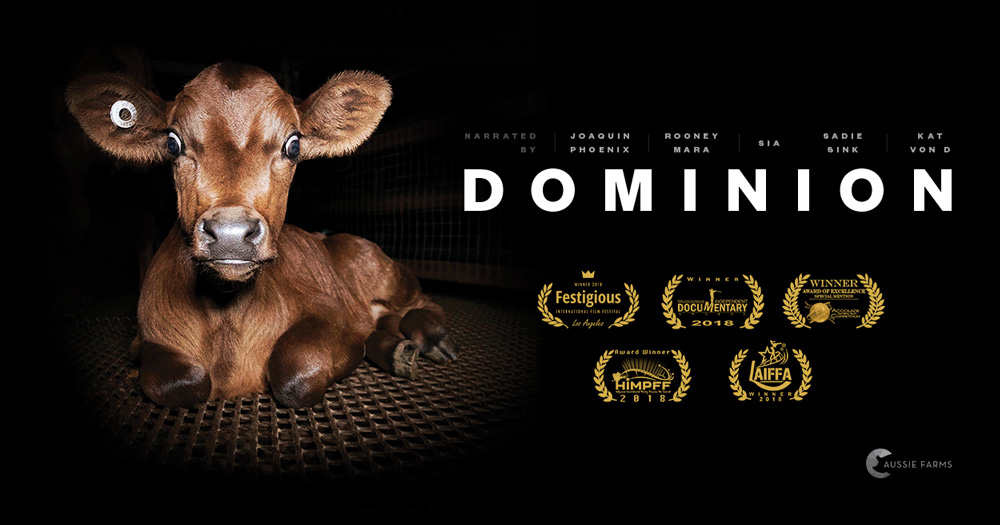
The organic myth
We as consumers have become more critical, questioning the conditions under which animals are kept and, thanks to research by animal rights activists, have gained more and more insight into the conditions and practices of the animal industry. Organic meat labels are the response to this. That people are willing to spend more money for less suffering is basically a good signal. But the bitter truth remains that it is cruel to take a living being's life just for the sake of taste.
The improvement of the conditions under which people are kept is not the solution to the problem. If, instead of the conventional 0.75 m2 in the highest type of husbandry, a sow has 1.3 m2 inside and outside 1 m2 then the industry speaks of "species-appropriate". The term has nothing to do with the natural way of life of the animals, but is used by the industry as a marketing trick to make the consumer feel that he or she has made an ethical and ecological decision with the purchase. When we talk about real justice, it means granting animals their right to their own lives.
Whether "organic" or conventional animal farming: In the eyes of the industry, animals are only products; they are bred to make money for the farmers and corporations. And this does not only apply to meat, but also to wool, eggs, milk, fish, honey etc.
Video: Organic hens and "Bioland" (high standard) pig fattening in Germany, ARIWA The recordings comply with the legal standards. For the complete videos on YouTube click here: pig fattening | henns/eggs
percent of the population is in favour of more animal welfare and stricter controls
The majority of the population is in favour of stricter controls of the Animal Welfare Act on farms and slaughterhouses. Currently, breeding and fattening farms in Germany are only inspected every 17 years on average.
percent of the population consumes animals and/or animal products
The proportion of citizens who do not eat meat is 12 %, which corresponds to about 8.7 million people. 900,000 of them live vegan, thus also without milk products and eggs – the numbers are rising.
percent of meat comes from factory farming
About 745 million animals are killed in Germany every year in factory farming - not including fish and crustaceans. In addition, meat and live animals with a slaughter weight of 850,000 tons are imported annually
Definitions
Veganism
Veganism means avoiding, as far as possible and practicable, all forms of exploitation and cruelty to animals for food, clothing or other purposes, and also promoting the development of animal-free alternatives that are beneficial to animals, people and the environment. So you don't have to love animals to live vegan and thus reject the injustice that happens to them.
Our activist Imke has discussed in this article, whether one can live 100 % vegan at all and which "illusory arguments" exist against veganism:
Vegetarianism
"Isn't vegetarianism enough?" We often hear this question during our demos. The vegetarian diet not a way of life with consistent ethical principles, but a form of diet in which animal products such as milk and eggs continue to be consumed. In the milk and egg industry, the animals are ultimately killed - as in the meat industry - and are sometimes exploited for many years.
In the following article, our activist Sabine described what the short, agonising life of a dairy cow and her calves in Germany looks like:
Speciesism
Speciesism is a belief that humans are morally superior to any other species simply because of their species affiliation. It is judgmental and assesses living beings on the basis of a single aspect. Other facts that may be far more serious for a moral decision, such as sentience, are usually ignored, presented as inferior to one's own interests or as negligible.
You can read more about this form of discrimination in Manuela's article "Speciesism and a potential approach to awareness".
All animals want to be free and happy.
You can make a difference with your way of life. The secret of success is to stay positive. Just focus on how easy the vegan lifestyle can be and don't try to be a "perfect vegan". This is an almost unattainable goal and carries the risk of making vegan life seem excessively difficult and preventing others from taking the same step.
If you want to experience the so-called "farm animals" in the greatest possible freedom, visit a sanctuary, where the animals are seen as individuals and physical and psychological needs are taken care of. Near Wilhelmshaven, for example, there is the Kuhaltersheim Hof Butenland or near Hamburg the Lebenshof Land der Tiere.
In this exciting interview on our blo you can find out how one of our activists, Peter Hübner, went from being a former butcher, angler and rodeo rider to becoming a vegan. If he can do it, you can do it too!
